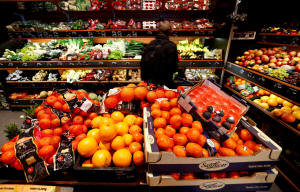Germany to skirt recession this year -institutes
 Send a link to a friend
Send a link to a friend
 [April 05, 2023] BERLIN
(Reuters) -Germany is expected to narrowly escape recession and post
modest growth in the first quarter of the year, according to the
forecasts of leading economic institutes published on Wednesday. [April 05, 2023] BERLIN
(Reuters) -Germany is expected to narrowly escape recession and post
modest growth in the first quarter of the year, according to the
forecasts of leading economic institutes published on Wednesday.
They said in their Joint Economic Forecasts they anticipate a 0.1%
expansion in gross domestic product in the first quarter, confirming a
report by Reuters on Tuesday. This follows a 0.4% contraction in the
fourth quarter of 2022.
"The economic setback in the winter half-year 2022/2023 is likely to
have been less severe than feared in the fall," said Timo
Wollmershaeuser, head of forecasts at the Ifo Institute. The main reason
for this is that purchasing power fell less than expected as a result of
a significant drop in energy prices.
For 2023 as a whole, the institutes expect the German economy to grow
0.3%, up from a predicted contraction of 0.4% in autumn.
"We will have to wait until we can see a significant slowdown in
inflation, as demand-pull inflation is unlikely to ease for now," they
said. This is due to government measures and expected higher wages.

The economic institutes predict an inflation rate of 6.0% in 2023
following 6.9% in 2022, before it slows to 2.4% in 2024 thanks to the
easing in energy prices.
The European Central Bank is expected to continue its tightening
campaign despite the turmoil in the banking sector. "These turbulences
haven't had any impact in our forecasts," said Wollmershaeuser.
He said that if bank turmoil were to increase, the potential
consequences would be a reduction in the credit offer of banks and the
ECB leaving its tightening path, which would make inflation stay higher
for longer.

[to top of second column] |

Full shelves with fruit are pictured in
a supermarket during the spread of the coronavirus disease
(COVID-19) in Berlin, Germany, March 17, 2020. REUTERS/Fabrizio
Bensch

According to the report, the central bank is expected to raise
interest rates by 50 basis points until the summer, with the bank's
main rate peaking at 4.0% in the third quarter.
"In our forecasts, we now have two more rate hikes this year," said
Wollmershaeuser. "It is still not clear if that's enough to tame
inflation."
During the year real wages should pick up. "This will put further
pressure on consumer prices," he said.
However, it will also have a positive impact in consumption in the
following year. Household consumption is expected to still decline
0.1% this year, but to rise by 1.0% in 2024.
Wages are expected to increase because the labour market remains
tight, which gives bargaining power to workers.
The impact of the weakening of the economy during the winter on the
labour market will be limited, the economists said. They forecast
that unemployment will be 5.4% this year and 5.3% in 2024.
German exports started the year as a drag on the economy but a
recovery is expected thanks to an easing of supply chain constraints
and high industrial orders, they noted.
The institutes estimate exports to have fallen 0.7% in the first
quarter of the year, but that should be compensated with an increase
of 0.9% in the second quarter.
In 2023 as a whole, exports are predicted to grow by 0.6%. In 2024,
there will a bigger rise of 3.4%.
(Reporting by Maria Martinez; editing by Rachel More, Mark John and
Mark Heinrich)
[© 2023 Thomson Reuters. All rights
reserved.]
This material may not be published,
broadcast, rewritten or redistributed.
Thompson Reuters is solely responsible for this content. |